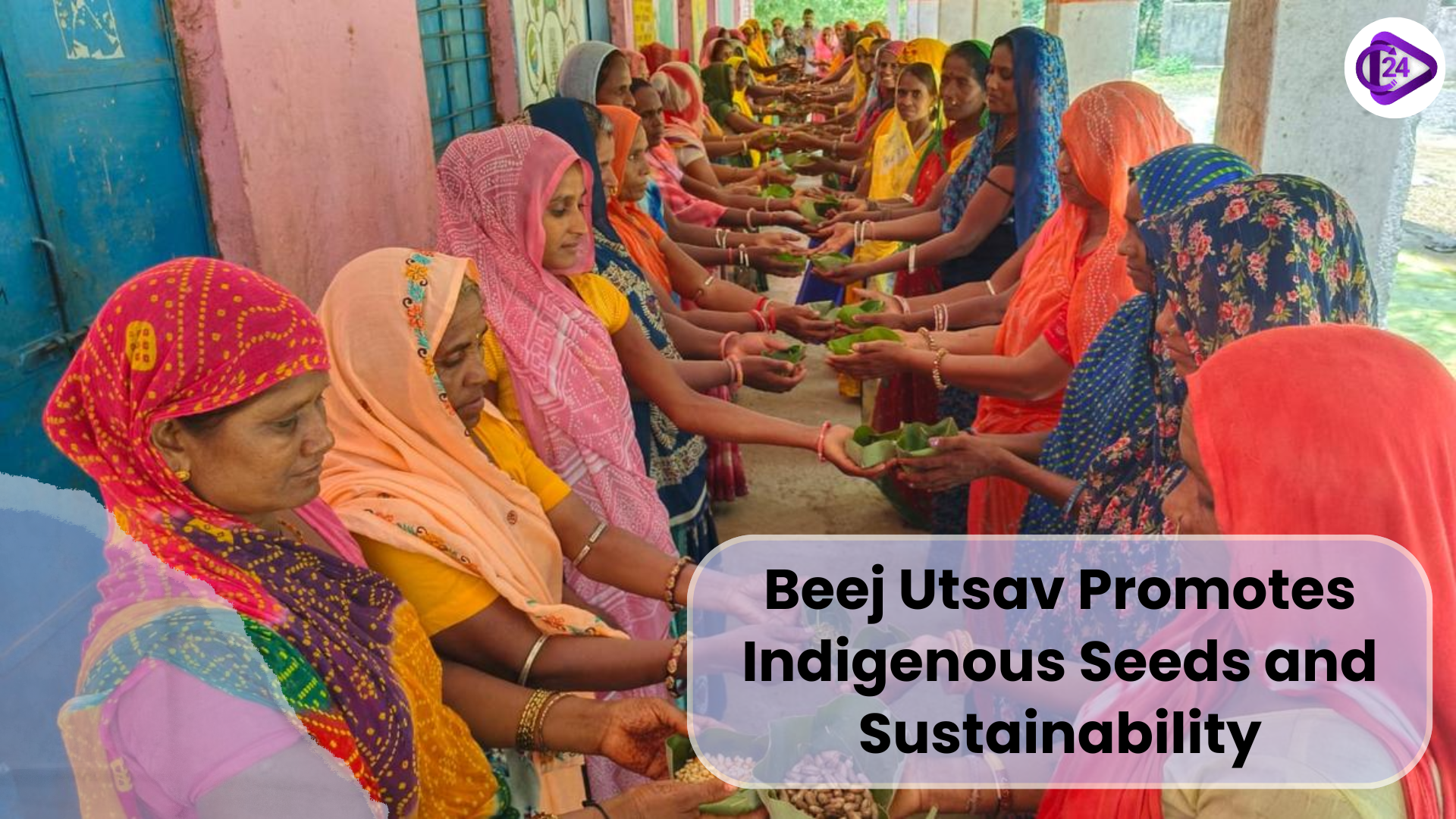
In the tribal areas in the states of Rajasthan, Madhya Pradesh and Gujarat, the seed festival or the Beej Utsav was celebrated in four days highlighting the role of indigenous seeds in ensuring agricultural sustainability. More than 9,400 tribal community members, including women and children, came across the techniques of preservation and utilization of indigenous seeds and to know the importance of preserving seeds in the context of maintaining biodiversity and ensuring climate resilience. There were activities like Beej Samvad (seed dialogue), seed balls and plantation drives at the festival. Independent community institutions such as Vaagdhara were very instrumental in the organizing of the event.
Context
-
In the states of Rajasthan, Madhya Pradesh and Gujarat, the agenda of Beej Utsav was the maintenance of indigenous seeds to ensure sustainability of farms.
-
The focus of the festival was intended to be to make people aware of the heritage of seeds, biodiversity and climate-friendly farming methods.
Key Points
-
Objective:
-
The festival aimed to highlight the importance of indigenous seeds in sustainable agriculture and promote community-led seed systems.
-
Allow tribal people to regain seed sovereignty.
-
-
Participation and coverage:
-
More than 9400 tribal members took part in it.
-
Took place in 60 panchayats and in Indian states.
-
-
Key Activities:
-
Beej Samvad -Seed preservation quotes.
-
Biodiversity fairs - Exhibition of local seed types.
-
Seed ball preparation-plantation drive- promote environment-friendly cultivation.
-
-
Honors & Awards:
-
Such arrangements were naming certain farmers as seed-saving Beej Mitra and Beej Mata.
-
In a bid to show appreciation to seed heritage custodians.
-
-
Institutional Involvement:
-
Organisers: Krishi Evam Adivasi Swaraj Sangathan, Gram Swaraj Samooh, Saksham Samooh, Bal Swaraj Samooh.
-
Backed by Vaagdhara (NGO of Rajasthan).
-
-
What is the meaning of Indigenous Seeds?
-
The kids are regarded as cultural representations of strength and identity.
-
Provide resilience to climate, nutrition and diversity.
-
Demand transition to community-based systems, away from hybrid and market dependent seeds.
-
What are Traditional Seeds?
Definition:
-
Indigenous crop strains farmed, preserved, and traded by farmers through generations.
-
Open-pollinated: able to replenish without losing genetic structure (as hybrid/GM seeds).
Major Properties of Conventional Seeds
-
Genetic Diversity:
-
Adjusted to the place (land, climate, pests).
-
E.g.: Eastern India with flood resistant traditional varieties of rice.
-
-
Climate Resilience:
-
Resist natural calamities like droughts, floods and pests.
-
E.g.: Desi cotton consumes 70% less water as compared to Bt cotton.
-
-
Minimum Input Need:
-
Grow flourishing with no artificial fertilizer or pesticides.
-
Affordable to small farmers.
-
-
Nutritional Value:
-
It is high in antioxidants, fiber and micronutrients.
-
E.g.: 3 times more calcium of ragi (finger millet) than that of milk.
-
-
Cultural and Ecological Meaning:
-
Inherent dinners in tribal fare, and in tribal fests in addition to agroecology.
-
Represent food sovereignty and Indigenous knowledge.
-
Significance of traditional seeds in India
-
Biodiversity Conservation:
-
Retain special genetic material which is essential in food security.
-
E.g.: Pokkali rice (Kerala) is found in salty water.
-
-
Climate Adaptation:
-
Able to withstand unpredictable climatic conditions and new pests.
-
e.g.: Bhut Jolokia (Assam) likes the humid environment.
-
-
Nutritional Security:
-
Greater meal fiber and micronutrients.
-
E.g.: Kodo millet contains 3x more fiber in comparison with wheat.
-
-
Farmer Autonomy:
-
Less reliance on seeds bought on the market.
-
E.g.: 80% of the cotton growers now depend on the expensive GM seeds.
-
-
Health and Sustainability of the Soil:
-
Increase the fertility of soil and ecological balance.
-
E.g: The Red Rice (Manipur) fertilizes the soil naturally.
-
Conclusion
The ‘Beej Utsav’ seeks to highlight the importance of indigenous seeds in the sustainability of agriculture especially in the tribal agricultural societies. The festival is directly contributing to the traditional agriculture in the community after popularizing the idea of preserving seeds within the community that is also eco-friendly but culturally relevant to the society. Such a project can become a successful example of the struggle against the problems of climate change and world food safety.



 Lt.-Gen. Pushpendra Singh Appointed as Vice-Chief of Army Staff
Lt.-Gen. Pushpendra Singh Appointed as Vice-Chief of Army Staff PM to Inaugurate Science Meet on Swaminathan’s Birth Centenary
PM to Inaugurate Science Meet on Swaminathan’s Birth Centenary Mera Gaon Meri Dharohar (MGMD): Cultural Mapping for Rural Identity and Development
Mera Gaon Meri Dharohar (MGMD): Cultural Mapping for Rural Identity and Development Rejuvenating the Noon River: A Model of Community-Led River Restoration in Uttar Pradesh
Rejuvenating the Noon River: A Model of Community-Led River Restoration in Uttar Pradesh Gavri Festival: Tribal Resistance and Ritual Theatre of the Mewar Bhils
Gavri Festival: Tribal Resistance and Ritual Theatre of the Mewar Bhils Mission Vatsalya Portal Relaunched to Strengthen Child Protection Services
Mission Vatsalya Portal Relaunched to Strengthen Child Protection Services Parliament Begins Process to Remove Justice Yashwant Varma
Parliament Begins Process to Remove Justice Yashwant Varma SC Amicus Seeks Exception for Consensual Sex Between Adolescents Aged 16–18
SC Amicus Seeks Exception for Consensual Sex Between Adolescents Aged 16–18 India Achieves 20% Ethanol Blending in Petrol — 5 Years Ahead of Target
India Achieves 20% Ethanol Blending in Petrol — 5 Years Ahead of Target Aadi Thiruvathirai 2025: Honouring Rajendra Chola I
Aadi Thiruvathirai 2025: Honouring Rajendra Chola I






